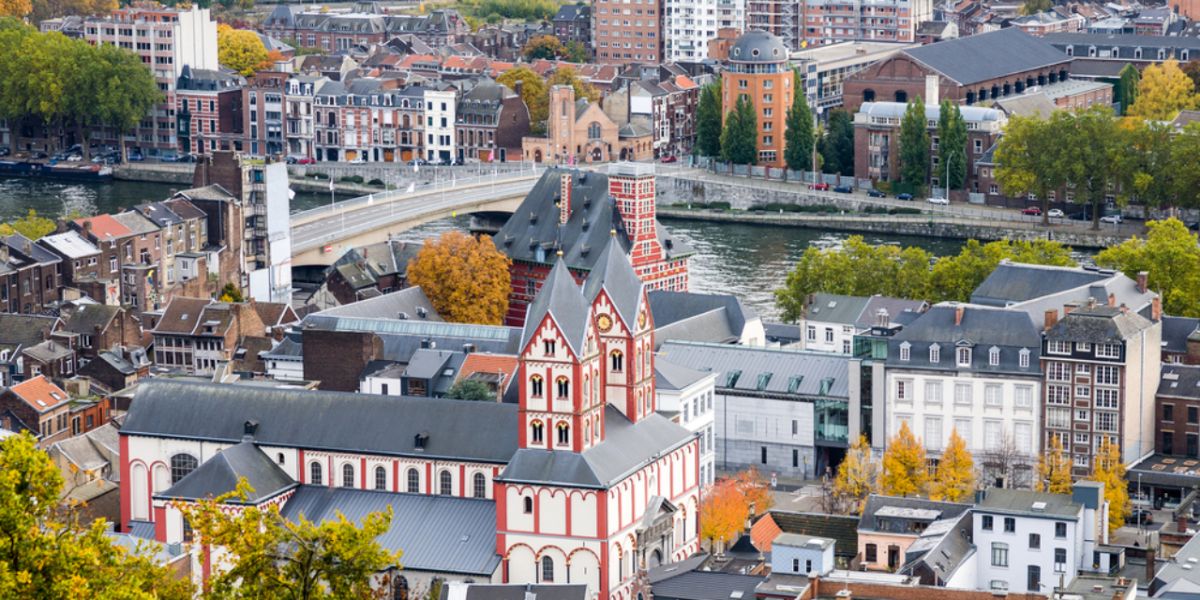
Liège, a dynamic French-speaking city resolutely focused on innovation, offers many professional opportunities in various sectors. Whether you're a newcomer or a resident, this guide gives you all the keys to succeed in your professional integration in Liège: recruiting sectors, employment agencies, work permits, salary levels, taxation, mobility, and work culture. Everything you need to approach your job search with confidence!
The economy of Liège
The economic capital of Wallonia and a French-speaking city, Liège is quite an atypical city. It hosts an airport specialized in air freight while also being the second largest inland port in Western Europe (the other is in Ghent). Its residents enjoy a dynamic and modern living environment.
Liège has always played a crucial role in the European economy as it has always been a vital industrial center. Its most significant role was in steel manufacturing. Indeed, Liège has been providing iron and steel to the world since 1817. While the city once boasted numerous blast furnaces and mills, today Liège is no longer a major name in steelmaking, although it still contributes enough to have a lasting impact on the local economy.
The city of Liège has also been a key player in the arms industry, offering armory services since the Middle Ages. Today, the headquarters of FN Herstal and CMI Defence are located there.
Industries in Liège
Numerous companies specialized in high technologies, such as aeronautics (with Techspace Aero) or the agri-food industry (with Juliper, Galler), are present in Liège.
So much so that the University of Liège hosts many subdivisions of these companies. Techspace Aero, for example, is responsible for manufacturing parts for the Airbus A380 and the Ariane 5 rocket. It is an excellent company to work for if you are pursuing a career in these fields.
The Liège airport is located near Bierset, just a few kilometers from the city center. Rather than a passenger hub, it is now a major freight platform: the 5th largest European cargo airport, 1st in Belgium, having handled over 1.1 million tons of goods in 2024. It generates numerous jobs, especially in logistics, transportation, infrastructure facilitation, and regularly attracts investors looking to establish themselves in the region.
Despite its small area of 69.39 km², Liège hosts industries vital to the Belgian economy, such as mechanical industries (aeronautics and space), space technologies, information technologies, and biotechnology. The city also has many companies producing beer, bottled water, and chocolate. Therefore, there are many job opportunities in these sectors. You may recognize some big names in this sector, like Galler, Spa, and Chaudfontaine, as they are well known in Europe.
Another unique aspect of this city is its specialization in optical components and air dryers. More specifically, the companies Amós, which manufactures optical parts for telescopes, and Drytec, which manufactures compressed air dryers, are based here. These may be niche sectors, but if you are interested or already have experience in these fields, you will be a highly sought-after candidate for positions in these companies.
If you are interested in the electronics sector, you will be pleased to know that Liège is a prime city for it. Major industry names such as EVS, AnB, IP Trade, SAP, Gillam, and Balteau are located here.
Liège also has a foothold in multimedia development. In addition to cutting-edge technologies, a massive audiovisual complex called Médiacité has been built in the city. It also has its own Image Hub. The headquarters of RTBF (Radio Télévision Belge Francophone, a public broadcasting organization) and its recording studios are located there. The Image Hub of Liège, which replaced a former tobacco company, also consists of companies specializing in audiovisual, 2D and 3D animation, web design, graphics, cinematography, and post-production.
Thanks to this, Liège is thus a major hub for filming animated and cinematic productions, both nationally and internationally.
This city is also famous for its folk festivals, which, as you might imagine, generate a lot of revenue. Liège is especially known for its nightlife, so the service industry is rich in job opportunities. For instance, there are many pubs and restaurants in the square-shaped district known as the "Carré." They serve customers until morning, making these establishments perfect jobs for students.
Moreover, Liège has a huge sports culture. It is home to several football teams, including Standard de Liège and R.F.C de Liège, one of the oldest football clubs in all of Belgium. The city also boasts a stadium, the Stade Maurice Dufrasne, which hosts numerous football matches throughout the year.
Job search in Liège
Job offers in Liège are mainly published in local newspapers, on job websites, or through private networks.
Today, many job seekers use LinkedIn because it is an easy-to-use platform where almost all professionals, as well as companies looking for top candidates, are registered. In fact, many European headhunters often recruit talent through this platform. Therefore, it would always be a good idea to sign up and update your profile if you already have one. LinkedIn also offers other very useful features, such as resume generators, interview tips, and more.
If you have just moved to Liège, you will need to prepare to take a job or register with the Walloon regional employment agency, Le Forem. This organization not only helps you find a job but also assists employers in recruiting. It can also help you with your administrative procedures, identify areas where you lack skills, and train you accordingly to become a more attractive candidate.
If you are abroad and have not yet moved to Belgium, you can still use the Forem website for free, benefit from their job search function, and create a searchable professional profile.
If you already live in Liège and are unemployed, be aware that the city has its own employment agency called ALPEMici. This organization aims to help long-term unemployed and/or benefit recipients to supplement their income for a better quality of life. Not only can they help you find a job, but if you have children, ALPEM can organize childcare so you can go to work. They also provide service vouchers for those needing professional housekeeping services and ironing stations.
The conditions for granting them are indicated.
Employment agencies are also a good option. The Liège agencies you can contact include SD Worx Staffing Liège, Randstad, Start People, Daoust, Accent Construct Eupen, Bureau de proximité Forem de Seraing, Adecco, and Synergie Liège Careers.
It will certainly be useful to offer them an updated curriculum vitae so they have a starting point. Once you have spoken to one of these agencies, they can connect you with jobs for which you are suited.
Employment rate in Liège
The employment rate in the province of Liège was about 65.1% in 2024. The employment rate remains below the Belgian national average, which is around 72% for those aged 20-64, and unemployment is slightly higher than the national average, estimated at 6.4%. That said, these figures should not discourage job seekers: Liège continues to offer many opportunities, especially in sectors such as aeronautics, technology, transportation, and services.
Work permit in Belgium
Whether or not you need a work permit will depend on your place of origin. Citizens of the European Union (EU), the European Economic Area (EEA), and Switzerland will not need a work permit as such. It will be a simple and straightforward process since you can move to Belgium and start working without formalities or waiting times. This can even work in your favor with employers, who often prefer profiles available quickly.
If you are not from EU, EEA, or Swiss countries, you will have a bit more work to do. There are three types of work permits in Belgium: type "A," "B," and "C". The one you will need will depend on your personal situation. For example, if you are not yet in the country, you will probably need the "B" work permit since the employer will recruit you from abroad.
Since the introduction of the Single Permit, work and residence permits are often combined into a single document to simplify procedures.
Salaries in Liège
When working in Belgium, you can expect a rather comfortable salary, especially compared to other regions in Europe. Since early 2025, the minimum gross salary for a full-time job (38h/week) has increased to €2,111.89 per month. This is not insignificant, and it is one of the highest minimum wages in Western Europe. And good news: average salaries follow the trend! A full-time Belgian employee earns on average €3,832 gross per month. If you have a master's degree, this can rise to €5,300, depending on the sector you work in.
And in Liège? The latest figures indicate an average gross salary of about €3,180 per month, or over €38,000 per year. Enough to live well, especially if you arrive with experience or a specialization. That said, don't forget that income taxes in Belgium can be quite high. Depending on your income, you will be taxed between 25% and 50%. It's something to keep in mind when calculating your budget.
Taxes in Belgium
Working in Liège, you will certainly have questions about the taxes that will accompany your salary. In fact, it will depend on your residency status in Belgium.
If you are only temporarily in the country and are not considered a legal resident, the taxes you will pay will only apply to the income you generate from Belgian clients. However, if you have a residence card, you will be taxed on everything you earn, regardless of its source.
Everyone must pay taxes every year. However, you will not have to do anything yourself. The tax authorities will inform you of the amount due by mail. From then on, you will have until June 30 to settle your taxes. If you are worried about paying too much tax and it cutting too much into your quality of life, you'll be relieved to learn that Belgium offers tax breaks for expatriates. If you are eligible, you can claim up to about €11,000 per year.
Work culture in Liège
If you are used to a top-down French work culture, you will feel comfortable in Liège workplaces. The majority of people in Liège speak French. But in recent years, employers have changed their management styles and are increasingly adopting the Dutch approach. This means that workplaces are becoming relaxed, with employees considered on a more or less equal level with their superiors. As a result, not only do workers have more of a voice, but they also have closer relationships with their superiors.
Commuting to work in Liège
The car offers more autonomy for commuting to and from work. It may even be your preferred mode of transport. The good news is that Liège is located at the crossroads of many major highways, which will make it easier for you to get to work and back.
In Liège, you can travel on the European roads E25, E42, E40, and E313, and due to the city's location, you will have excellent direct connections to Antwerp and Rotterdam. Alternatively, the city is connected to Antwerp via the Albert Canal and to Rotterdam via the Meuse.
And if you come from further away, there is an efficient rail network connecting Liège to most of Western Europe.
There are thus three main train stations in Liège: the Liège-Guillemins, Liège-Carré, and Liège-Saint-Lambert stations. Otherwise, you can also take the Intercity Express and Thalys trains to Cologne and Frankfurt in Germany, or Paris-Nord in France. Note that these trains only stop at Liège-Guillemins.
In Liège, you will not find a metro, but a modern tramway network inaugurated on April 28, 2025. Line 1 connects Sclessin to Coronmeuse, with a branch to Bressoux, over nearly 11.7 km and 23 stations.
The tram now operates 18 hours a day (from 5 a.m. to 1 a.m.), at regular intervals, and now forms the backbone of the Liège public transport network.
We do our best to provide accurate and up to date information. However, if you have noticed any inaccuracies in this article, please let us know in the comments section below.








